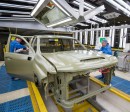The chip shortage that has caused so much trouble in the automotive industry is already showing significant signs of recovery.
But at the end of the day, where one wins, another one loses, as the improving global chip inventory is bad news for semiconductor manufacturers across the world.
Foundries have seen their order books getting filled overnight after the debut of the health crisis in 2020, and since then, they have all been working around the clock to produce chips, while also investing aggressively in expanded capacity.
The drop recorded by the IT industry also impacted chip foundries in Asia, with their operation rates falling dramatically in the last few months. The demand from automakers is the one that now spearheads the production, but certain chips, such as 8-inch wafers that are aimed at new-gen electronics, are suffering big drops in demand.
Almost all South Korean chip makers are reporting a significant decline in their operation rates. Samsung, DB Hitek, Key Foundry, and SK Hynix System IC, all are seeing their operation rates going down at a faster pace than the industry watchers predicted.
Hynix, for example, currently runs at 50 percent capacity, down from over 90 percent during the health crisis, even when restrictions were in place at Chinese facilities. Samsung is the company that keeps going strong, though it records a small decline as well. Its 12-inch fabs continue to be in hot demand, with the operation rate currently at over 80 percent.
The dropping demand for chips is an indication that sales of certain devices, including phones and PCs, are collapsing. But at the same time, industry experts claim that most customers manage to build up high inventory, especially in an attempt to prevent supply chain disruptions in the short term.
Carmakers are the ones still struggling with a constrained chip inventory, and the most important figures in the industry believe that 2023 would continue to be a challenging year on this particular front. GM’s CEO Mary Barra previously said the American carmaker expects the semiconductor inventory to cause disruptions in vehicle production even beyond 2023, especially as the demand in this sector remains at record levels.
Auto manufacturers are investing aggressively in new-generation cars that rely on more advanced systems. As such, the number of chips they require is increasing as well, so securing the necessary inventory in the long term can’t happen overnight.
The investments in expanded capacity specifically aimed at the car industry also take years to produce an improvement, as most new factories wouldn’t start building chips sooner than 2024 or 2025, at the earliest. As a result, the drop recorded by South Korean chip foundries isn’t surprising, though most companies are already preparing plans that would allow them to focus on industries where the demand remains strong, including the automotive sector.
Foundries have seen their order books getting filled overnight after the debut of the health crisis in 2020, and since then, they have all been working around the clock to produce chips, while also investing aggressively in expanded capacity.
The drop recorded by the IT industry also impacted chip foundries in Asia, with their operation rates falling dramatically in the last few months. The demand from automakers is the one that now spearheads the production, but certain chips, such as 8-inch wafers that are aimed at new-gen electronics, are suffering big drops in demand.
Almost all South Korean chip makers are reporting a significant decline in their operation rates. Samsung, DB Hitek, Key Foundry, and SK Hynix System IC, all are seeing their operation rates going down at a faster pace than the industry watchers predicted.
Hynix, for example, currently runs at 50 percent capacity, down from over 90 percent during the health crisis, even when restrictions were in place at Chinese facilities. Samsung is the company that keeps going strong, though it records a small decline as well. Its 12-inch fabs continue to be in hot demand, with the operation rate currently at over 80 percent.
The dropping demand for chips is an indication that sales of certain devices, including phones and PCs, are collapsing. But at the same time, industry experts claim that most customers manage to build up high inventory, especially in an attempt to prevent supply chain disruptions in the short term.
Carmakers are the ones still struggling with a constrained chip inventory, and the most important figures in the industry believe that 2023 would continue to be a challenging year on this particular front. GM’s CEO Mary Barra previously said the American carmaker expects the semiconductor inventory to cause disruptions in vehicle production even beyond 2023, especially as the demand in this sector remains at record levels.
Auto manufacturers are investing aggressively in new-generation cars that rely on more advanced systems. As such, the number of chips they require is increasing as well, so securing the necessary inventory in the long term can’t happen overnight.
The investments in expanded capacity specifically aimed at the car industry also take years to produce an improvement, as most new factories wouldn’t start building chips sooner than 2024 or 2025, at the earliest. As a result, the drop recorded by South Korean chip foundries isn’t surprising, though most companies are already preparing plans that would allow them to focus on industries where the demand remains strong, including the automotive sector.






